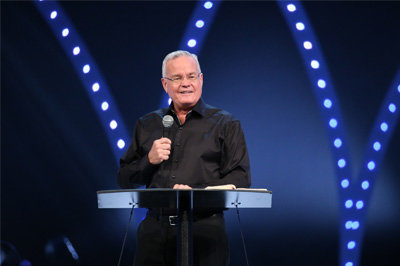Bill Hybels has been one of the most well-known and influential pastors in America for at least three decades. He is the founder of Willow Creek Community Church in South Barrington, Illinois and has been the senior pastor since its beginning in 1975.
He is the bestselling author of more than twenty books, the chairman of the board for the Willow Creek Association, a non-profit, denomination-like organization that has equipped and empowered hundreds of thousands of church leaders from 90 denominations in 128 countries and 60 languages through the church’s Global Leadership Summit.
Willow Creek is one of the largest and most prominent churches in America with up to 25,000 in attendance each week at its eight locations. I have been to Willow Creek for one of their seminars and for a worship service. The property looks like a corporate headquarters or a very upscale mall. It actually has most of the amenities of a mall with a large bookstore and a food court with several vendors. From the huge auditorium you can see through a panoramic window beautiful swans gliding across the lake.
I had the opportunity to meet Hybels. In a seminar he conducted he talked about leadership and his counsel to then president Bill Clinton. He talked about his heritage and his love for piloting his sailboat. He is the kind of man who attracts others by virtue of his appealing personality. He is one of the most articulate, engaging and amiable men I have ever met.
 Bill Hybels, founding pastor of 25,000-member Willow Creek Community Church, will step down from his senior pastor role in October 2018 to spend more time developing Willow Creek Association and The Global Leadership Summit. WCCC/Special
Bill Hybels, founding pastor of 25,000-member Willow Creek Community Church, will step down from his senior pastor role in October 2018 to spend more time developing Willow Creek Association and The Global Leadership Summit. WCCC/SpecialUnder the leadership of Hybels, Willow Creek began to model a seeker-sensitive approach to church growth. The purpose of the seeker-sensitive services was to attract post-moderns back into the fold. Drama, visual effects, and a new musical style were introduced into the worship experience. According to Christianity Today “the 45-minute exegetical sermon (was) replaced by a shorter, story-based talk to address the ‘felt needs’ of the congregants.
In my opinion a seeker-sensitive fellowship with a ‘felt-needs’ approach to ministry has the potential of leading to a consumer-friendly philosophy, which can also lead to a man-centered rather than Gospel-centered church. Erik Raymond, writing for the Gospel Coalition, stated, “A Gospel-centered church cannot be catered to a consumer society.
“I know it is increasingly unfashionable to say anything negative about anybody or anything anymore, but at some point, you have got to let the implications of the Gospel stand or else you do actually lose the Gospel. A Gospel-centered church should hopefully be intriguing and even strange, but it should not be attractive to a consumer-driven culture. These two cannot walk together because they do not agree” (Amos 3:3).
About ten years ago Willow Creek published their findings from an in depth qualitative study of its ministry. They wanted to know what they were doing that was helping people mature in their faith and what they were doing that was not spiritually productive.
Greg Harkins, executive pastor of Willow Creek, co-authored a book, Reveal: Where Are You? in which he revealed that much of their programming did not result in their people growing in the grace and knowledge of Christ. According to multiple reports Hybels was greatly distraught with the findings, but honest enough to declare that the church had “made a mistake.”
 Willow Creek has adopted a far more seeker-friendly worship service since its founding. WCCC/Special
Willow Creek has adopted a far more seeker-friendly worship service since its founding. WCCC/SpecialWhile Hybels and the church leadership attempted to reinvent their ministry many churches that attempted to follow their lead were beginning to discover that the recovery and revitalization of their ministries were not easily accomplished.
Earlier this week The Christian Index ran the announcement from Willow Creek indicating that Bill Hybels’ successor had been named. Actually, there were two successors named. The article stated, “Stepping into the role of lead pastor is Heather Larson, 42, formerly the executive pastor of the church and its eight Chicago-area locations. Assuming the title of lead teaching pastor will be Steve Carter, 38, who has been Hybels’ teaching associate for the last five years.”
The article also explained that Hybels would continue to coach and develop these leaders until he transitions off the church staff in October 2018. The chairperson of the elder board, Pam Orr, expressed her delight in the way the staff and congregation have navigated the succession process.
Obviously, Willow Creek Community Church and Bill Hybels have accomplished some significant things, and others can learn from their successes, but Baptist pastors and Baptist churches must make sure they are getting the vision for their church from above and be cautious about following men and ministries no matter how successful they may be.
It is easy to fall into the trap of pragmatism (whatever works) and miss out on God’s special plan for your work and ministry.
The promise of the Bible is “Trust in the Lord with all thine heart; and lean not unto thine own understanding. In all thy ways acknowledge Him, and he shall direct thy paths” (Proverbs 3: 5-6).